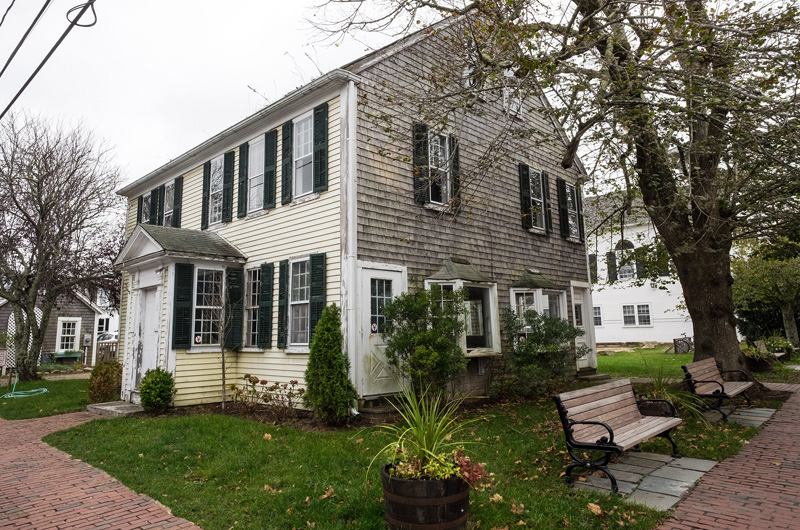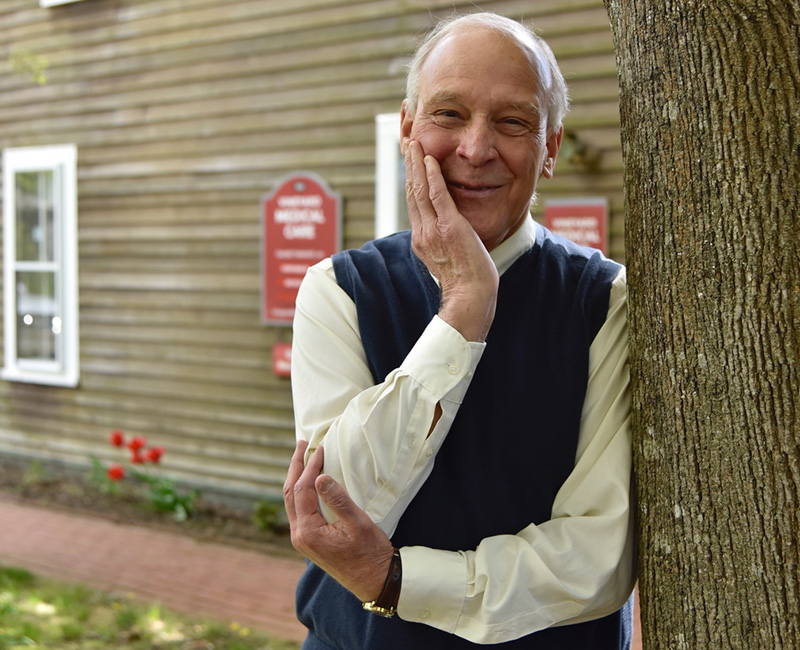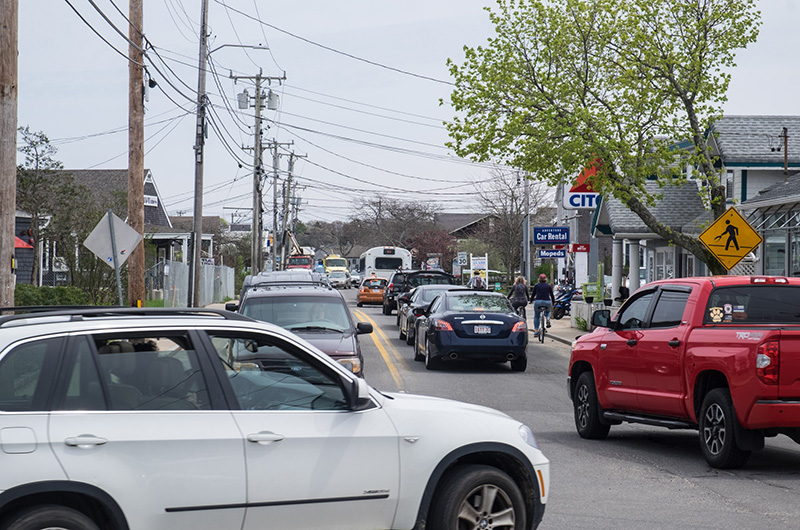As 2018 comes to a close, it may be best remembered as the year Islanders learned just how fragile their bridge to the mainland is. And while the Steamship Authority, plagued by unprecedented numbers of cancellations, breakdowns and mishaps, dominated the news and conversation, it was not the only news.
The Wampanoag Tribe of Gay Head (Aquinnah) finally completed its legal odyssey in the federal courts, gaining hard-won permission to build a gambling hall on tribal land at the western tip of the Island. Island voters elected a new superior court clerk and register of probate, but the real electoral story was the spike of participation in the November mid-terms as voters joined their restless counterparts around the country.

There were ballot reversals and just plain puzzling results. In Tisbury, voters approved funding for a new school at the annual town meeting, then reversed course at the ballot box. In Oak Bluffs, town residents gave a thumbs-up for a new town hall funding plan at town meeting, then in the privacy of the voting booth appeared to say: never mind.
Vineyard students stood up, walked out and joined in the protests over gun violence that killed students in their schools elsewhere in the country. The youth surge also produced more immediate, tangible results. Keith Chatinover accepted his Charter School high school diploma in June, and soon after began campaigning for the Dukes County Commission. Through write-in votes, he made it through the September primary, then won a spot on the commission in the November election.
After a rough 2017 that included community outcry over the firing of its CEO, the Martha’s Vineyard Hospital navigated smoother waters in 2018 as a new team took charge and vowed an open-door approach.
As usual, Vineyarders took the measure of the Island’s environmental health. There were hard questions about the tipping point of Island capacity in wake of a record number of cars in the summer. Islanders tracked the ongoing decline of right whales, passed town initiatives to limit herbicide spraying near power lines and stayed alert to the contamination of private water wells near the airport from firefighting foam. Serious concerns about tick-borne illnesses were underscored by a fatal case of tularemia, and the spread of the aggressive Lone Star tick across the Island.
•
For the Steamship Authority, the year brought wave after wave of problems. (As a measure of how bad it got, one of the SSA’s shuttle buses burst into flames, damaging more than a dozen vehicles parked in the Palmer lot.)
Due to mechanical problems and service disruptions, the ferry service suffered hundreds of canceled trips during the first four months of the year, more than triple the number from the previous four years put together. At one point, 70 passengers were stranded for five hours on the ferry Martha’s Vineyard, which lost power during a night run to Woods Hole in March and had to be towed back to Vineyard Haven, where it reached the dock just before 2 a.m.
The SSA board of governors was slow to respond to public concerns and warning signs. The board at first resisted a call for an independent review of the boat line operations, but ultimately changed its stance amid widespread public pressure.
The operational problems could not have come at a worse time, as the boat line was knee-deep in a $60-million project to build a new terminal and docks in Woods Hole. By the end of the year, the project had fallen behind schedule and the terminal design was due for revisions because of complaints.
Governors finally commissioned a top-to-bottom examination by Seattle-based HMS Consulting, which released its report earlier this month. The findings confirmed a widespread perception that the ferry line, despite a close eye to the bottom line and the dedication of employees, lacked strategic vision, employee training and protocols, modern communication and management equal to the task.
John Sainsbury, president of the firm, pulled no punches at a Dec. 17 public meeting. In short, “half measures” will not be enough to cure what ails the authority, he said. “These changes are not going to be easy,” he said. “They’re going to cost money. They’re going to upset people. Not everybody’s going to agree. They’re going to require resources.”
In response, governors planned to schedule a series of wintertime meetings to unpack the findings of the 140-page report and respond.
•

The year was a clear reminder that nature ultimately will be heard, and in March the message came in a deafening fury of successive, destructive storms. The Island had barely recovered from a prolonged deep freeze in January, when a series of northeasters roared in. Back-to-back storms caused widespread power outages for several days in some parts of the Island, toppled trees like matchsticks and inundated beachfront property and inland roads. Despite all that, no one was seriously injured. But in May crews were still cleaning up thousands of downed trees in conservation land. “More damage than I’ve seen since Hurricane Bob,” said Dylan Bilzerian of Bilzerian Tree Service.
After a tumultuous 2017, the Martha’s Vineyard Hospital began 2018 on more stable footing, hiring a new president and chief executive officer. Pledging an open-door policy and improved communication, Denise Schepici’s administration appeared to calm roiling waters. The hospital board of trustees also saw changes, with longtime chairman Timothy Sweet stepping down after 21 years of service.
Eight days into the new year, the U.S. Supreme Court declined to review a lower court decision affirming the tribe’s right to operate a Class II gaming operation in Aquinnah. Later in the year, the tribe announced a partnership with the Chickasaw Nation of Oklahoma, which has a substantial portfolio of gaming and other entertainment venues. By December most details remained publicly unknown about the tribe’s bingo parlor plans.
Reflecting the national mood, in November polling stations around the Island saw unusually high turnout despite relatively few contests. Turnout in every Island town was at least 64 per cent — in West Tisbury it was 75 per cent.
Vineyard Haven attorney T. George Davis prevailed in a contest for superior court clerk, a position held for the past 40 years by Joseph E. Sollitto Jr., who is retiring. Interim register of probate Daphne DeVries of Edgartown won her first election. A full slate of seven Dukes County Commissioners was elected, with two newcomers John Cahill, a Tisbury businessman, and Keith Chatinover of Edgartown, who enters Middlebury College this winter.
•

You could be forgiven if you had to strap on a neck brace after watching efforts to build a new school in Tisbury and a new town hall in Oak Bluffs.
At their April town meeting, Tisbury voters widely approved a $46.6 million initiative to replace the brick school constructed in 1929. Then just a few weeks later, the widely-debated plan was scuttled by 21 votes in the annual town election. The issue left the town deeply divided, but ultimately school and town officials went back to the drawing board about how to provide adequate facilities for the town’s schoolchildren.
In Oak Bluffs, a similar process played out over efforts to build a new town hall. In November, voters agreed at a special town meeting to add another $1.3 million to the $9.8 million project to award the low bid and begin construction. At a special election two days later, the extra spending was shot down 370-295. Selectman Greg Coogan summed up the situation in blunt terms. “We’ve been trying to get a new town hall for 27 years,” he said, “and we keep finding roadblocks to it.”
Vineyard students raised their voices in several settings, primarily over the issue of gun violence. In February, after 17 students were killed at a Florida high school, scores of students at the regional high school walked outside to honor the victims. “It Could Have Been Us” and “Fear Has No Place Here” were signs spotted in the student-led walkout.
A month later, scores of students were among a substantial Vineyard contingent that traveled to the March for Our Lives march in Washington D.C., a national demonstration against gun violence.
“Let’s show people that teenagers and young adults can do stuff,” said Mr. Chatinover, the chief Vineyard organizer of the trip. “Let’s rise to the occasion.”
Three Island towns selected new police chiefs in 2018. Edgartown welcomed Bruce McNamee, a police captain from Plymouth with deep Island ties. Tisbury selected Mark Saloio, an administrative lieutenant from Sturbridge. And West Tisbury promoted from within — new chief Matthew Mincone had held virtually every job in the department before he took the reins in late March.
In other law enforcement news, Cape and Islands assistant district attorney Laura Marshard was ordered to serve a one-month suspension for a rules violation stemming from her meeting with a witness in a 2014 assault case without his attorney present. In Oak Bluffs, Det. James T. Morse, a 23-year veteran of the force, was terminated by town selectman after using an FBI database to conduct background checks on people not under investigation.
•
Venerable businesses changed hands. The Harbor View Hotel in Edgartown was sold in January for $30 million to Bernard Chiu, a seasonal resident of the town. The hotel closed in October for extensive renovations and plans to reopen by Memorial Day 2019.
Back Door Donuts, best known for sending sweet late-night aromas down Kennebec avenue and baking world record-sized apple fritters, was bought by three well-known Boston businessmen and seasonal Vineyard residents: Richard Friedman, Patrick Lyons and David Ginsburg.
In Vineyard Haven, Hinckley’s Lumber fell on hard times and was ultimately sold to a group of investors who hope to build commercial and condominium housing. By the end of the year, the building was gone, razed to make way for the next chapter on Beach Road.
Little House Café went on the market while Rainy Day store on Main Street changed hands. In West Tisbury, the Lambert’s Cove Inn was sold for $5.5 million to a Boston businessman. Lola’s restaurant in Oak Bluffs, a well-known eating and drinking refuge for summertime visitors, was sold for $2.3 million. But before she closed the doors on an era, Kathy Domitrovich, who had owned the restaurant for decades with her late husband Paul, threw a farewell bash that will be long remembered.
In Edgartown, the butcher Shiretown Meats closed for business after more than three decades, while the hostelry next door, the Clarion Inn, was sold for $8 million. Further down Main street, the restaurant Alchemy also changed hands.
Two landmark up-Island properties and one youth sports mecca saw dramatic transitions.
Beetlebung Farm in Chilmark, tended by four generations of the Fischer family, was sold for $2.4 million to new owners who want to keep the farm running.
The majority of the storied north shore estate once owned by the late Washington Post publisher Katharine Graham, about 186 acres with frontage on Lambert’s Cove in West Tisbury, went on the market with an asking price of $39.5 million. Not included in the sale was Mohu, the 40-acre heart of the property which remains family held.

The Vineyard Youth Tennis Center, which has provided free tennis instruction for Island children for 20 years, made plans for a new era without the largesse of its longtime benefactor Gerry DeBlois. Going forward, the organization will rely on a new financial model, open a new facility, launch a new adult program and adopt a new name: Vineyard Family Tennis.
The YMCA and Martha’s Vineyard Arena completed plans to formally merge by the end of the year. Two West Tisbury nonprofits devoted to horseback riding — Rising Tide Therapeutic Equestrian Center and the Martha’s Vineyard Community Horse Center — also announced a merger.
Chappaquiddick now has fewer reasons to complain about phone reception; it finally got approval for a permanent cell tower. It also saw the premiere of the eponymous feature film about Mary Jo Kopechne and Sen. Edward M. Kennedy’s fateful plunge off the Dike Bridge. Meanwhile, Chilmark ended years of contentious meetings and court challenges with the completion of a different kind of bridge — a 300-foot elevated causeway to Squibnocket Farm, and the transformation of Squibnocket beach and its parking lot.

In Edgartown, the Yellow House on Main street, long vacant and dilapidated, got new life with a proposal to convert the building and an adjoining structure into retail and residential space. The Carnegie library on North Water street was transformed as the rebranded and renovated Carnegie, a museum that trains the spotlight on the Island history through properties owned by the Vineyard Trust.
•
The Island bade a final farewell with stirring memorials to some iconic civic leaders, artists, fishermen and distinctly Vineyard characters: Ed Jerome, former Edgartown School principal and longtime honcho of the Martha’s Vineyard Striped Bass and Bluefish derby; Peter Simon, the barefoot photographer and visual chronicler of Island people and places; Edith W. (Edo) Potter, Chappaquiddick matriarch, political leader and conservationist; Peter Martell, colorful Oak Bluffs businessman who had served as the town’s emergency management director; Greg Mayhew, the commercial fishing captain who piloted the Unicorn and Quitsa Strider; Ben Moore, West Tisbury architect and affordable housing advocate; Trina Kingsbury, artist, poet and award-winning horsewoman; Bill Stafursky, veterans advocate; Lucy Hackney, lawyer, civil rights activist and children’s advocate; legendary Menemsha fisherman Jimmy Morgan; and Mark London, former Martha’s Vineyard Commission executive director.
In mid-January, the high school was rocked by a fatal car accident that killed senior Jake S. Baird.
On Jan. 1, longtime Edgartown businessman Robert M. (Coo) Cavallo died at home at age 65. In June his friends and family resurrected the family’s traditional Monday night softball game to raise money for his favorite cause, the Martha’s Vineyard Arena.
This month on Memorial Wharf in Edgartown a tower of more than 150 lobster pots went up in the shape of a Christmas tree, the number 76 perched inside a silver star on top. That was Neil Estrella’s number when he played football at the regional high school. In October Mr. Estrella died at 44 of pancreatic cancer, and the tree was a fundraiser for his family.

•
Retirements included Dr. Gerald Yukevich, longtime family physician; Brock Callen, executive director of Sail Martha’s Vineyard; Paul Leonard, Oak Bluffs postmaster; Bridget Tobin, a favorite among Islanders who managed the Steamship Authority terminals for 40 years; Wanda Williams, Edgartown town clerk; Joseph E. Sollitto Jr., Dukes County superior court clerk who presided for more than four decades at the brick courthouse in Edgartown; and Dr. Henry Nieder, who planned to doff the scrubs after three decades at the hospital. The Island’s lone full-time cobbler Nancy MacMullen of Vineyard Haven retired after 37 years, a blow to those looking to extend the lifespan of their comfortable kicks. Coast Guard master chief Robert Riemer completed his four-year tour as commander of Menemsha Station.
And Philip J. (Jeffrey) Norton Jr., the soul of Edgartown town meetings and moderator for the past 43 years, laid down his gavel and stepped down from the Old Whaling Church Stage this year. Town poet laureate Steve Ewing paid tribute in a poem that likened Mr. Norton to a steady captain at the helm of a cargo schooner:
You’ve left us better
For your time
Guiding our lively
Rolling helm
•
The struggles of Islanders — and efforts to provide help and support for them — made headlines in 2018. Marches, walks and vigils were held to draw attention to drug addiction, suicide and domestic violence. The opioid crisis was no less urgent in 2018, and a joint hospital-Community Services program had resulted in more than 110 placements in off-Island detox programs by the beginning of the year. In May, Community Services cut the ribbon to a new Island Intervention Center, described as a first stop for those experiencing mental health or drug problems, headed by island native David Araujo.
•
Finally, there was no dearth of inspiring Islanders, on the playing fields, on the stage and in everyday life.
Clarence A. (Trip) Barnes 3rd, the larger-than-life Island character and storyteller whose name is emblazoned on moving trucks that have spanned the country, was feted with the Creative Living Award from the Permanent Endowment at a rollicking ceremony. Chris Porterfield and Jean Llewellyn received awards for their commitment to volunteerism.
At the high school, students performed a boffo production of the musical West Side Story in February, dazzling audiences and filling the seats for a weekend run in February. In April, Noelle Lambert scored a goal in her first game back for the University of Massachusetts-Lowell lacrosse team — on a prosthetic leg. The Londonderry, N.H., junior had returned 20 months after a devastating 2016 moped accident on the Vineyard.
The Quixotic quest of boatbuilder Ted Box to build the 70-foot scow Seeker faced innumerable hurdles, not least among them inadequate funds and a bout with throat cancer. But after seven years, on a sunny July day with calm seas, Seeker was launched from her Beach Road perch into the Vineyard Haven harbor, with the help of two excavators and a tugboat. “It’s alive,” Mr. Box said, standing on the stern.

The Martha’s Vineyard Sharks, the Island’s summer baseball team, played a magical season that took it to the top, where it shared the Futures League Baseball League championship with the Worcester Bravehearts. After each team won a game apiece in the best of three-game series, the deciding game was tied 1-1 after the first inning, when the heavens opened up and a downpour ended the game and the season. How else could such a series end?
Superlatives have been exhausted to describe the regional high school girls’ tennis team, which won its fourth straight state championship, by beating Winchester 4-1. The team amassed a phenomenal 85-1 record over the past four seasons.
After its championship match in June, the players and coaches came off the ferry holding the trophy aloft, greeted by a cacophony of sweet sounds: cheers and applause from family and friends, honking horns and blaring sirens from fire trucks and police cruisers.

















Comments (5)
Comments
Comment policy »